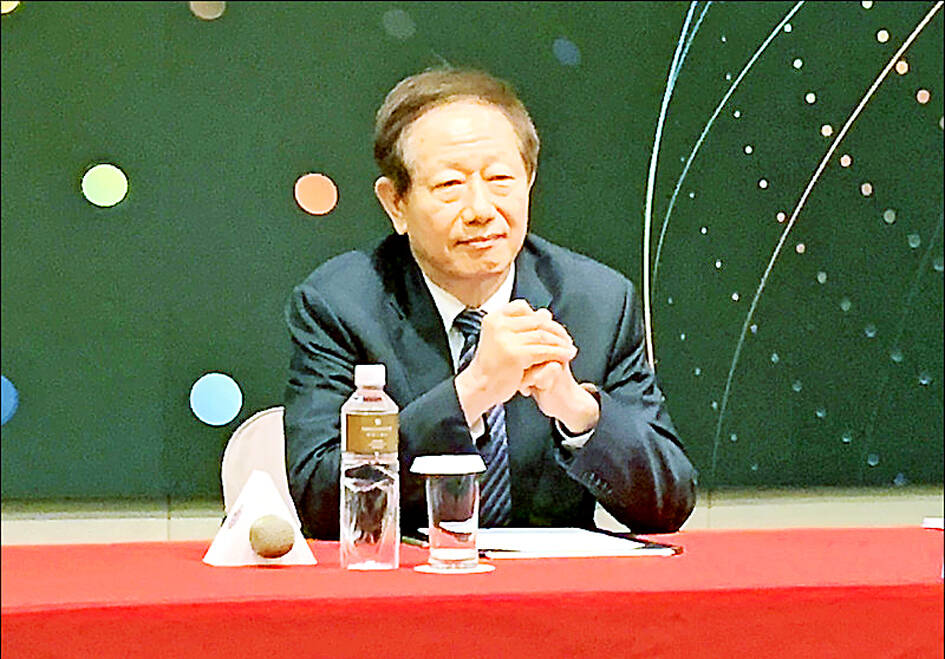Slower global economic growth and US export restrictions would dent revenue at Taiwan Semiconductor Manufacturing Co (TSMC, 台積電) over the next 12 to 18 months, Moody’s Investors Service said in its latest report.
“We expect revenue at TSMC to fall by 1 percent after its robust growth of around 40 percent in 2022,” it said, adding that earnings would also slip from a high comparison base.
Nevertheless, strong net cash positions and good access to funding would enable the company to weather the short-term challenges, Moody’s said.

Photo: Hung You-fang, Taipei Times
Slowing global growth, coupled with high interest rates and inflation, is reducing chip demand, especially for consumer electronics and smartphones, it said.
Chip inventory corrections due to stockpiling during the COVID-19 pandemic are also curbing order inflows, it added.
US export restrictions that limit China’s ability to obtain or build advanced computer chips would take a gradual toll, eating into TSMC’s revenue and earnings growth potential, but the effects are expected to be limited, as TSMC has a one-year exemption, Moody’s said.
Softening consumer demand would reduce capacity utilization, weighing on adjusted earnings before interest, taxes, depreciation and amortization (EBITDA) margins, a key profitability measure, it said.
SPENDING
In the face of the new trade hurdles, TSMC needs to continue spending heavily to develop next-generation technologies and increase capacity so that it can meet an expected surge in chip demand over the next three years, given accelerating digital transformation and breakthroughs in artificial intelligence-powered applications, Moody’s said.
Yet, new products would weaken margins and hurt profitability in the early stage, while intense competition causes price pressure, it said.
TSMC’s adjusted EBITDA margin would decline to 68.5 to 69.0 percent this year from 70.4 percent last year, it added.
Despite the challenges, TSMC holds a healthy cash balance, exercises stable dividend policies and generates solid cash flows, which would help the company maintain stable credit quality this year, Moody’s said.
Last year was a bumper earnings year for TSMC and other independent foundry service providers, it said, adding that TSMC derived more than 90 percent of its revenue from semiconductor foundry services.
TSMC shares fell 1.58 percent to NT$559 in Taipei trading yesterday, Taiwan Stock Exchange data showed.

Taiwan Semiconductor Manufacturing Co (TSMC, 台積電) would not produce its most advanced technologies in the US next year, Minister of Economic Affairs J.W. Kuo (郭智輝) said yesterday. Kuo made the comment during an appearance at the legislature, hours after the chipmaker announced that it would invest an additional US$100 billion to expand its manufacturing operations in the US. Asked by Taiwan People’s Party Legislator-at-large Chang Chi-kai (張啟楷) if TSMC would allow its most advanced technologies, the yet-to-be-released 2-nanometer and 1.6-nanometer processes, to go to the US in the near term, Kuo denied it. TSMC recently opened its first US factory, which produces 4-nanometer

PROTECTION: The investigation, which takes aim at exporters such as Canada, Germany and Brazil, came days after Trump unveiled tariff hikes on steel and aluminum products US President Donald Trump on Saturday ordered a probe into potential tariffs on lumber imports — a move threatening to stoke trade tensions — while also pushing for a domestic supply boost. Trump signed an executive order instructing US Secretary of Commerce Howard Lutnick to begin an investigation “to determine the effects on the national security of imports of timber, lumber and their derivative products.” The study might result in new tariffs being imposed, which would pile on top of existing levies. The investigation takes aim at exporters like Canada, Germany and Brazil, with White House officials earlier accusing these economies of

Teleperformance SE, the largest call-center operator in the world, is rolling out an artificial intelligence (AI) system that softens English-speaking Indian workers’ accents in real time in a move the company claims would make them more understandable. The technology, called accent translation, coupled with background noise cancelation, is being deployed in call centers in India, where workers provide customer support to some of Teleperformance’s international clients. The company provides outsourced customer support and content moderation to global companies including Apple Inc, ByteDance Ltd’s (字節跳動) TikTok and Samsung Electronics Co Ltd. “When you have an Indian agent on the line, sometimes it’s hard

PROBE CONTINUES: Those accused falsely represented that the chips would not be transferred to a person other than the authorized end users, court papers said Singapore charged three men with fraud in a case local media have linked to the movement of Nvidia’s advanced chips from the city-state to Chinese artificial intelligence (AI) firm DeepSeek (深度求索). The US is investigating if DeepSeek, the Chinese company whose AI model’s performance rocked the tech world in January, has been using US chips that are not allowed to be shipped to China, Reuters reported earlier. The Singapore case is part of a broader police investigation of 22 individuals and companies suspected of false representation, amid concerns that organized AI chip smuggling to China has been tracked out of nations such